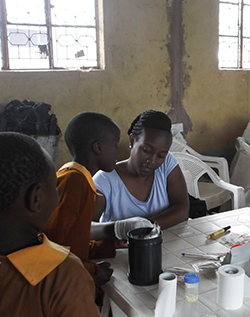A public health expert from Kenya with particular expertise in parasitic diseases will be spending a full academic year at Hollins as a Fulbright Scholar-in-Residence (S-I-R).
Isabell Kingori, who teaches in the School of Public Health at Kenyatta University in Nairobi, is coming to Hollins for the 2021-22 academic session to further infuse a global perspective into the university’s public health curriculum.
In January, the Fulbright S-I-R program, which supports international academic exchange between the United States and more than 160 countries around the world, approved a joint proposal by Hollins and Virginia Tech to bring an S-I-R to their respective campuses, with the individual spending 80 percent of their time at Hollins. The S-I-R will provide an international point of view to the undergraduate public health programs launched at both universities during the 2019-20 academic year.
The residency, which was originally scheduled to occur during the 2020-21 academic session, was postponed for one year due to the COVID-19 pandemic.
Kingori, who also serves as the curriculum coordinator in Kenyatta’s Department of Environmental and Occupational Health, holds both a Master’s degree and a Ph.D. in applied parasitology. Between earning her advanced degrees, she taught part-time for eight years and also worked at the African Medical and Research Foundation.

“Dr. Kingori has taught a lot of different undergraduate and graduate courses and units during her teaching career, including parasitology, immunology, epidemiology, environmental health, and much more. We’re excited by the breadth of options she might be able to cover,” said Elizabeth Gleim, an assistant professor of biology and environmental studies at Hollins who co-authored the proposal to bring an S-I-R to Hollins and Virginia Tech with Gillian Eastwood, an assistant professor of entomology at VT.
“The Fulbright program requires applicants to select two specific countries from a particular continent from which to draw potential candidates for the Scholar position,” Gleim explained. “Gillian and I narrowed our choices to Kenya and South Africa. Africa has so many fascinating disease systems, and in those two countries, scientists are conducting some very interesting research. Also, approaches to and access to healthcare in Africa are different than what students might be familiar with here in the U.S. Because diseases don’t recognize borders or boundaries, it’s important that our public health students have an understanding of these different health care settings around the globe and that they are familiar with disease systems outside of the U.S. regardless of whether one plans to work domestically or internationally.”
Gleim noted that the existence of an endowed fund created specifically to bring international faculty members to campus was instrumental in gaining approval from the Fulbright program. “Without a doubt, Hollins’ financial support of the S-I-R via the Jack and Tifi W. Bierley International Professorship significantly enhanced our proposal.” She added that small liberal arts colleges are among the colleges and universities to whom the S-I-R program gives preference, particularly those who are seeking to grow service to minority populations.
Established in 1946, the Fulbright Program is funded by an annual appropriation from the U.S. Congress to the U.S. Department of State. Its goal is to increase mutual understanding and support between the people of the United States and other countries while transforming lives, bridging geographic and cultural boundaries, and promoting a more peaceful and prosperous world.











